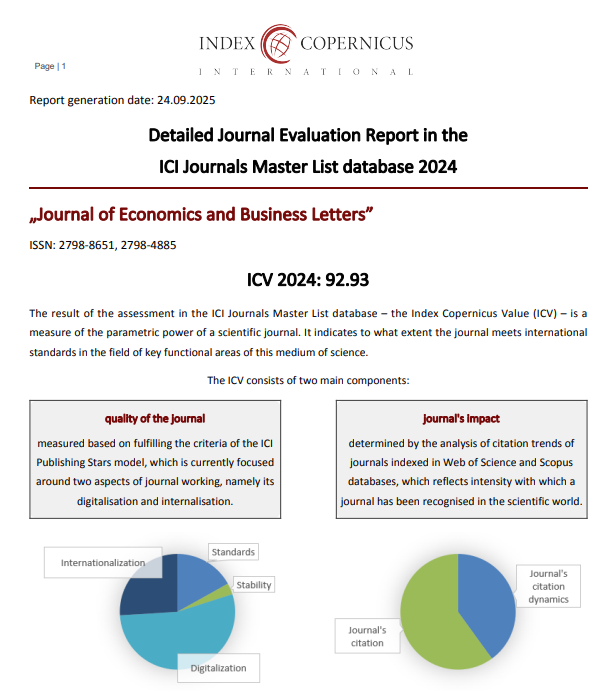Credit control and interest-income reliability in a community microfinance cooperative: Evidence from a kelurahan - level PMK case
DOI:
https://doi.org/10.55942/jebl.v5i4.854Keywords:
microfinance cooperative, credit control, interest income, accrual suspension, non-performing loansAbstract
This study examines how credit control disciplines—process conformance, authorization limits, collection oversight, and accounting recognition—shape the stability of interest income in a kelurahan-level microfinance cooperative (Koperasi PMK). Using a descriptive–analytic, quantitative design with secondary financial statements, the analysis connects the cooperative’s Standard Operating Procedures (Institutional and Education SOPs) to the full credit cycle (origination, appraisal, approval, disbursement, collection, remedial) and to recognition policies for performing and non-performing loans. Findings indicate a consistent execution gap: although approval hierarchies, 5C/7C screening, and periodic reviews are formally specified, field-intensive collections and limited information systems delay risk classification and accrual suspension. The absence of a dedicated accrued-interest ledger (PYMAD) and incomplete off-balance-sheet treatment for NPLs create a bias toward overstated interest income during stress, followed by reversals. The study argues that hardening execution—not redesigning policy—yields the highest payoff: enforce status-based recognition (accrual for performing, cash basis for deteriorated), stand up PYMAD and provisioning by collectibility bucket, implement maker–checker and daily receipt–ledger reconciliations in collections, and institutionalize monthly early-warning reviews under board and supervisory oversight. These steps trade short-term reported income for durable, decision-useful interest earnings, aligning sustainability with the cooperative’s outreach mandate.
References
Atichasari, A. S., Sukono, & Supian, S. (2023). Examining non-performing loans on corporate financial performance: Evidence from Indonesia. Sustainable Futures, (6), e100137. https://doi.org/10.1016/j.sftr.2023.100137
Churchill, S. A. (2020). Microfinance financial sustainability and outreach: Is there a trade-off? Empirical Economics, 59, 505–536. https://doi.org/10.1007/s00181-019-01709-1
Cull, R., Demirgüç-Kunt, A., & Morduch, J. (2007). Financial performance and outreach: A global analysis of leading microbanks. The Economic Journal. https://doi.org/10.1111/j.1468-0297.2007.02017.x
Fakhrunnas, F., Syapriatama, I., & Siregar, H. (2022). The determinants of non-performing loans/financing in Indonesian banking: An asymmetric approach. SAGE Open, 12(3). https://doi.org/10.1177/21582440221102421
Kepmen Koperasi & UKM No. 91/Kep/M.KUKM/IX/2004 (Petunjuk Pelaksanaan Koperasi Jasa Keuangan Syariah). Local government legal repository (PDF): https://dpmptsp.pekalongankota.go.id/index.php/id/download/category/34-koperasi-ukm?download=411%3Asyariah dpmptsp.pekalongankota.go.id
Nazara, S. (2024). Influence of Standard Operational Procedures on employee performance in regional public order operations. ProBisnis: Jurnal Manajemen, 15(1), 150–161. (Open-access PDF). https://www.ejournal.joninstitute.org/index.php/ProBisnis/article/download/489/399/1853 ProBisnis
Pergub DKI Jakarta No. 96 Tahun 2008 tentang Pengelolaan Dana Bergulir Pemberdayaan Ekonomi Masyarakat. Jakarta JDIH (PDF): https://jdih.jakarta.go.id/link/download-fulltext/12249
PP No. 9 Tahun 1995 tentang Pelaksanaan Kegiatan Usaha Simpan Pinjam oleh Koperasi. Official text (BPHN PDF): https://bphn.go.id/data/documents/95pp009.pdf BPHN
Rauf, F., Wanqiu, W., Jing, L., Qadri, F., Naveed, M., & Rahman, S. (2022). Dynamic analysis of the determinants of long-term microfinance interest rates: Macro and micro factors. Frontiers in Psychology, 13, 1008002. https://doi.org/10.3389/fpsyg.2022.1008002
The Effectiveness of Standard Operating Procedures in Government Services. (2019). In Proceedings of the 2019 International Conference. https://doi.org/10.4108/eai.16-10-2019.163231
Sarwono, Jonathan. (2006). Metode Penelitian Kuantitatif dan Kualitatif. Yogyakarta: Graha Ilmu
Sugiyono, S. (2010). Metode Penelitian Kuantitatif dan Kualitatif dan R&D. Alfabeta Bandung.
Uddin, M. H., Li, J., & Xu, W. (2024). Why do microfinance institutions charge higher interest rates? Journal of Behavioral and Experimental Finance, 42, 100995. https://doi.org/10.1016/j.jbef.2024.100995
UU No. 25 Tahun 1992 tentang Perkoperasian. Official portal (BPK RI): https://peraturan.bpk.go.id/Details/46650/uu-no-25-tahun-1992 BPK Regulation
Downloads
Published
How to Cite
Issue
Section
License
Copyright (c) 2025 Ari Puryani

This work is licensed under a Creative Commons Attribution 4.0 International License.
















